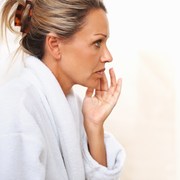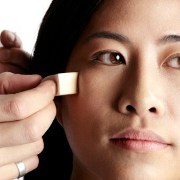 MonkeyBusiness Images/PhotoSpin
MonkeyBusiness Images/PhotoSpin
Rosacea is a chronic skin condition that causes redness, flushing and bumps across the face that can be mistaken for acne. The cause of rosacea has been unknown.
However, recent research indicates that tiny mites that live on the skin might be the cause or more accurately, bacteria that live in these mites may be the culprits.
Rosacea typically affects those between the ages of 30-50 and occurs more often in women then men. It often flares in response to stress or overexposure to the sun.
Antibiotics have often been given to treat rosacea to reduce inflammation symptoms but doctors have been baffled as to why other drugs such as steroids, which also reduce inflammation, do not seem to help.
Sciencedaily.com reported that Kevin Kavanagh, PhD, a biologist at the National University of Ireland, Maynooth in Kildare, Ireland and his team performed a review of the literature to try and determine which bacteria might be triggering rosacea attacks.
The research review findings were published in the November, 2012 issue of the Journal of Medical Microbiology.
According to WebMD, “Demodex mites live on the skin of 20% to 80% of adults. The tiny bugs are invisible to the naked eye. Until recently, it was thought that the mites lived harmlessly, feeding off the oily sebum that coats the skin.”
Kavanagh described how changes in the skin due to stress, age or illness cause the population of mites to swell. It has been found in research that people with rosacea have 10 times more Demodex mites than the general population.
What was discovered is that certain bacteria live inside these mites and when these mites die then they release the bacteria onto the skin. It is theorized that those excess bacteria are what triggers the reaction of redness and inflammation.
“What's more, this bacterium is sensitive to the antibiotics used to treat rosacea,” reported Sciencedaily.com.
Michele Green, MD, a dermatologist at Lenox Hill Hospital in New York City told WebMD that she felt that theory had merit, as “many people with rosacea notice that their skin gets worse after exposure to heat and humidity, conditions that also help mites thrive.”
While this concept is still in the theory stage some pharmaceutical companies are looking into medications to control the mite population rather than just producing topical or oral antibiotics to treat the bacteria on the skin.
More research will be needed, but Green feels that new technologies may come up with better and safer ways to combat roseacea.
Sources:
Bacterial Cause Found for Skin Condition Rosacea. Retrieved Jan. 31, 2013.
http://www.sciencedaily.com/releases/2012/08/120829195121.htm
Are Mites Causing Your Rosacea?Bacteria From Tiny Bugs May Be at the Root of Troubling Skin Condition. WebMD. Retrieved Jan. 31, 2013.
http://www.webmd.com/skin-problems-and-treatments/news/20120830/are-mite...
Rosacea: Acne rosacea. PubMed Health. U.S. National Library of Medicine. Retrieved Jan. 31, 2013.
http://www.ncbi.nlm.nih.gov/pubmedhealth/PMH0001882/
Jarmuda, Stanisław et al. The potential role of Demodex folliculorum mites and bacteria in the induction of rosacea. Journal of Medical Microbiology, 2012 DOI: 10.1099/jmm.0.048090-0
http://jmm.sgmjournals.org/content/61/Pt_11/1504
Michele is an R.N. freelance writer with a special interest in woman’s healthcare and quality of care issues. Other articles by Michele are at www.helium.com/users/487540/show_articles
Edited by Jody Smith
February 4, 2013





Add a CommentComments
There are no comments yet. Be the first one and get the conversation started!